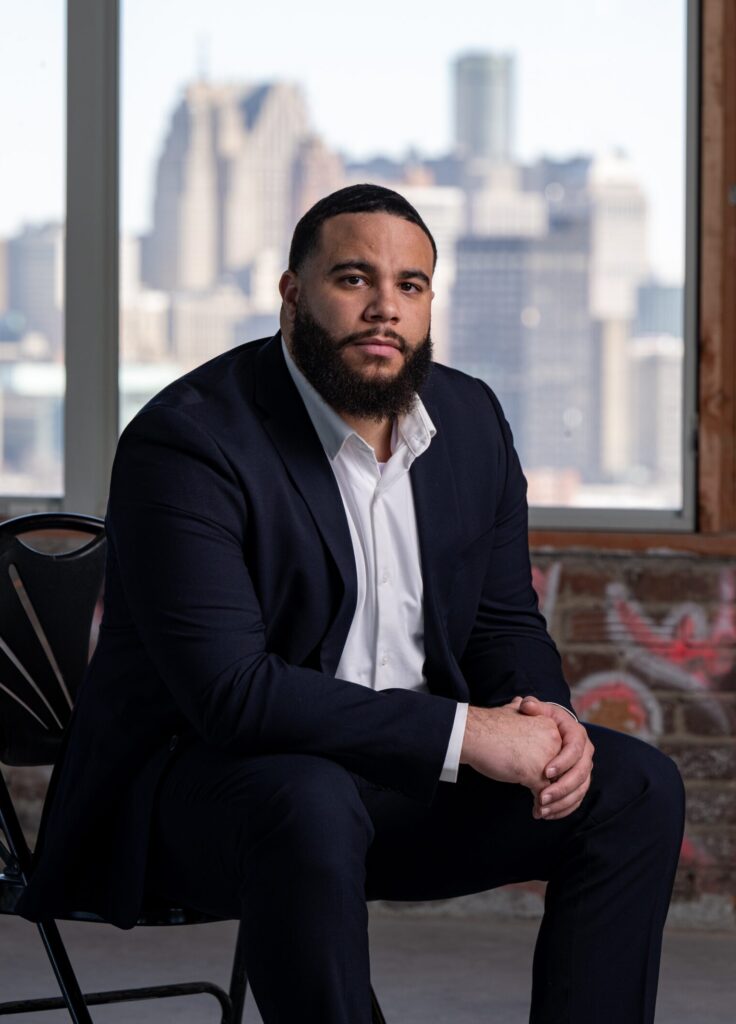Source: Michigan News
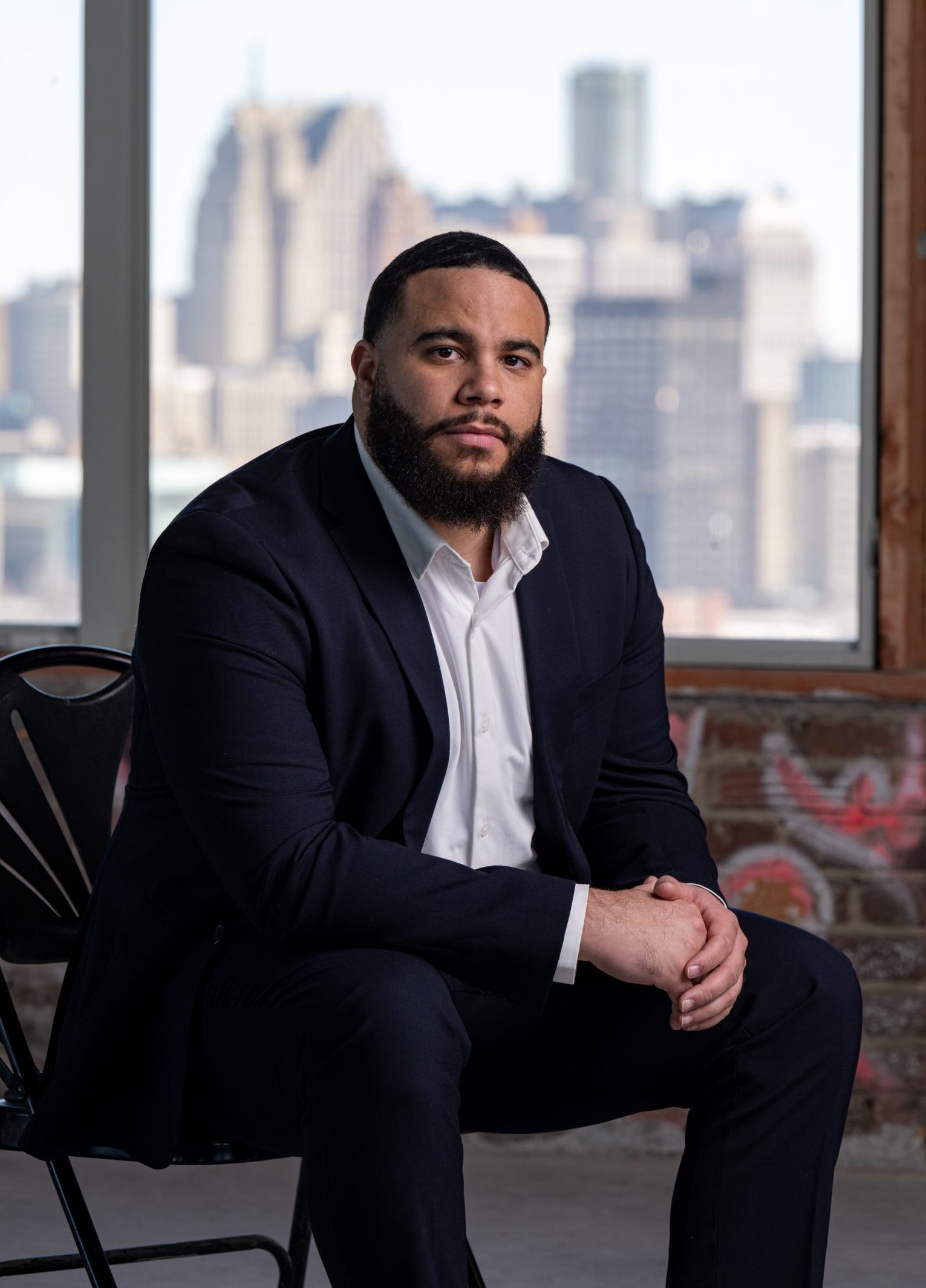
Nando Felten. Credit: Eric Bronson, Michigan Photography.
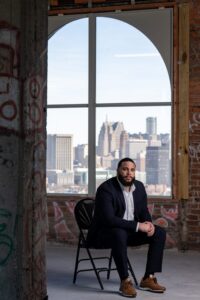
Nando Felten, alum and community manager at Google’s Code Next Detroit. Credit: Eric Bronson, Michigan Photography.
Nando Felten, a first-generation college student, feels like he’s lived several lifetimes at just 26.
He was born in Germany where his father was stationed in the U.S. military. Felten spent part of his childhood in Detroit, moving permanently to the city at 12.
The community manager for Google’s Code Next Detroit, which has its high-tech maker space at Michigan Central Station, has dedicated much of his time since age 18 to creating learning and career opportunities for underrepresented students like himself.
While an undergraduate student at University of Michigan, he helped create Building Successful Bridges, a mentoring program for minority students ages 16-21 that emphasizes pre-career skills and networking. As a graduate student, he helped create the U-M Marsal School of Education’s LEAPS program – an undergraduate degree program that focuses on community engagement and problem-based learning and includes a year living and learning at the School at Marygrove in Detroit. LEAPS stands for Learning, Equity, and Problem Solving for the Public Good.
Felten earned his bachelor’s in education policy and master’s in educational design and technology from U-M. He joined the board of directors for the Skillman Foundation in January. He’s also on the board of directors for the Umoja Debate League in Detroit.
Tell us about Code Next Detroit and what your role is here.
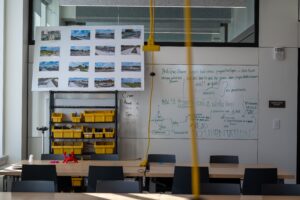
Google’s Code Next Detroit.
Code Next exists to create excellence driven work around STEAM education. You think about computer science. So unfortunately, the state of Michigan does not mandate that a high schooler takes computer science as a course. That’s not a requirement at all. And most of the programs that do exist are only exposure-based, which is key, essential, fundamental. But unfortunately it lacks the actual ability for a young black and brown kid to come in and to excel.
When I got to U-M, I was behind, not just academically, but in untaught pre-career skills. So this space allows students to create, have an outlet for design thinking, to become technology leaders and really embrace that impact in this space. It is not just a safe space, but it’s their space. When they come into this space, they learn that this space was designed by peers, by their peers, just like them.
You’ve been deeply involved in creating educational opportunities for underrepresented students both at the high school and college level. What inspired you to do this work?
So I was born in Germany. My father was in the Air Force and he met my mother on base. I lived in Germany until I was about five. My love for cars started at a very young age. Being born in Germany, I always saw myself as engineered in Germany and then hand-built in Detroit. So it’s like, for some reason, the automotive inclination for me, the love for technology was just there at birth.I moved to Detroit in a series of events that I like to say could sound like a script for a movie. My biological mother abandoned me because of her mental illness and I was taken in by my father until I was 12. By that age, I had lived in about 25 homes, six states and two countries.
As a kid, I didn’t know what was going on, but my father unfortunately had lost his job and his 401k. Dad spiraled into deep depression. It’s messed up. He was legally blind from the military and they wouldn’t give him his disability. It took him, it was so much going on. And unfortunately, he tried to commit suicide, and I saved his life. And so the adults in my life were like, ‘Yeah, Nando shouldn’t be living with his father.’ Because of all these circumstances, I was missing a lot of school. I’m happy that my dad never made us feel like we were actually homeless, because at times I was just sleeping at my friend’s house, hanging out with my friend Dylan, or I would be at my dad’s friend’s house or sleeping on the couch or sleeping in the guest rooms. But I didn’t know we were homeless until I got to look back and reflect on it.
And so subsequently, I came to Detroit in 2010 for Christmas. So I wanted to spend time with my older brother here. I grew up from there in Brush Park. I played football and basketball. And then my father kind of went ghost. He told me later in life that the hardest decision for him was to give me away, essentially. Because he knew he couldn’t take care of me. He was living out of a car. So he made the decision to leave me in the care of his oldest son. So my brother and his girlfriend at the time split up. I think me coming into their life when they were only 27 years old, caused a lot of turmoil.
But his girlfriend said, ‘I’ll take care of you no matter what.’ And from those moments forward, that’s been who I called my mom. So she’s from Detroit as well. So that connection of what I like to call being adopted, I wasn’t just adopted by that woman, but I was adopted by the city. And so that community aspect has really driven my work and who I am as a person.

Nando Felten. Credit: Eric Bronson, Michigan Photography.
So as a student who, to add some more layers to this, remember I was born in Germany. I didn’t have a birth certificate, which means I didn’t have proof of U.S. citizenship until I was 20 years old. So I applied to around 19 colleges, and the only college that would accept my DACA (Deferred Action for Childhood Arrivals) status was U-M.
Yeah. I remember I applied to U-M multiple times, and the first time they denied me because they said that my high school curriculum wasn’t good enough. They’re honest. I went to a small charter school, and they said, we need you to take pre-algebra or pre-calculus. And so I took it and they were able to say, okay, after next semester, apply again. And then I ended up applying again.
U-M called me when I was at Party City. I was at the store getting ready for my high school graduation party, and they called me while I was in the store, perfect timing, and said, ‘Hey, Nando, you’ve been accepted to the University of Michigan. You didn’t just get one scholarship, you got three full-ride scholarships.’ They gave me three scholarships to pick from. The Detroit Promise is the one I finally ended up going with, which paid for tuition and fees up to 10 terms.
But then when I got to campus, I realized that I was behind, not just academically, but I didn’t know the importance of networking. I didn’t know the importance of what it meant to wear a suit. I didn’t learn how to tie a tie until my last day of high school. And I didn’t know how important that would be for my life. To wear a suit, own a suit, and have fashionable clothes within that market was so important to me. But what I learned the most was networking.
What would you say is the impact of Building Successful Bridges?

The skills that we taught ourselves to then teach others, was probably the most fundamental skill that I developed during this whole process of creating Building Successful Bridges, which is now a nonprofit. And essentially what we do is we do workforce development for kids. We help kids get into the workforce beyond the general narrative – through entrepreneurship, through self-exploration, and by putting industry professionals in front of them to really dive deep into what their passions are.
The real world should reflect the classroom should reflect the real world, and that’s what it should be. The classroom should reflect the real world.
Our main focus is essentially what I’m doing right now is teaching people how to tell their story. So we have a curriculum around storytelling, the art of networking, and essentially finding alignment with students into helping them get ready for work.
Building Successful Bridges started with 10 of us at the University of Michigan. Now it’s only three active members from that same team. But when I tell you that process and journey was incredible, we were able to create something for ourselves that we realized like, ‘Hey, we’re at the University of Michigan now, and when we have this on our resume, we’re okay. We’re good, but these kids, we need to teach them.’
And what was it like to get LEAPS from idea to launch?
I started working with LEAPS in undergrad. I met Professor Leslie Herrendohl while I was taking a class at U-M around trauma-informed based learning. And so I was at Parkridge Community Center in Ypsilanti doing some interning with the youth there around trauma informed based learning, using the arts and theater to help kids with dealing with trauma. And so Leslie was new to the university at the time. This was in 2018 or so, right before COVID.

LEAPS was just an idea. Barry Fishman worked on it for I think maybe 10 years before. We met in Leslie’s backyard, had a barbecue, me, Barry, Leslie and Marsal School Dean Elizabeth Moje along with me, Kingsley Enechwuku and Darrell Tubbs from Building Successful Bridges. And essentially they asked me, Kingsley and Darrell to help them develop this program, a new undergraduate major, different from anything that has ever existed. So I’ve been in meetings from financial aid to picking the students to creating student profiles. I took three classes that Barry taught around the design of the program. So I worked around thinking about recruitment, admissions, student life, what is it going to be like? And even the aspect of what does this degree even mean and why is this degree important?
I looked at myself, I mean, I started school, wanted to be an engineer. I ended up graduating with a degree and residential college in education policy. So I made my own degree essentially for my undergrad. And so this degree, the LEAPS degree essentially is that community engaged person that wants to make an impact in places and spaces. And learning from a place like Detroit. I mean, there’s so much history here. It’s so unique. If you can pull on the uniqueness of Detroit, I mean, you can take that method and be successful anywhere. Learning about culture, learning about how to actually work in a community.
What are some of the ways you would recommend that U-M students get involved in what’s happening in Detroit right now? And what are some of the skills that are most critical for this work?
I want everyone to come to Detroit, but only if they want to. I know right now one of the largest questions that are floating around Detroit and Michigan is Michigan’s not just the greatest exporter of cars second to Germany, but it’s the greatest exporter of talent. Most of my friends that graduated from the University of Michigan don’t live here. They live in Chicago, New York, Los Angeles, Georgia, Texas.
Why not come here? There’s so much land, there’s so much opportunity. Think about the potential. You want to start a company. There are investments being made. There are opportunities being made to drive it.
So the U-M students should be able to come into Detroit and realize that what makes Detroit a unique place is that you can do so much more here. So I would say the biggest skills they need are honestly not the ones you see on a resume.
How do you collaborate with U-M today?
We’ve taken the kids on tons of tours at U-M and Mcity. We work with Ross MBA students, and LEAP students come to Google Next Detroit as interns. I work with the School of Information, helping them with their case studies around entrepreneurship for kids.

Student creations at Google’s Code Next Detroit. Credit: Eric Bronson, Michigan Photography.
Because what I found to be very important is having near peer mentors and teachers. If a college kid can teach a high schooler and get college credit, and if a high schooler can learn from a college student and not just get high school credit, but college credit, we solved some problems.
Who do you think of at U-M as your mentor or who inspired you to get involved in this work?
Leslie Rupert Herrenkohl, she’s the director, Eileen Lappin Weiser Center for the Learning Sciences. Leslie helped me understand why education is a tool for liberation. Leslie has been there since 2018. And so from undergrad through my master’s, she’s definitely helped me transcend through tons of adversity, because I didn’t even tell you what happened in college. College was not easy.
I was DACA (Deferred Action for Childhood Arrivals) student until 2020, so all I had for identification was my Mcard. There were a lot of times for undergrad, I didn’t think I was going to make it. My father died in 2020 and my brother died in 2021.
I was a Blavin Scholar, a program for undergraduate students who have experienced foster care, kinship care and are going to college without parents or guardians to support them. And even Leslie and her husband, when I told her the news, when my brother passed away, I wanted to defer from my master’s program. I said, ‘I don’t think I can do this right now. It’s not possible. I can’t really, there’s a lot going on’. And she was like, ‘Well, Nando, how about you enroll into one class?’ Now, one class I enrolled in was the class with Barry that did work on LEAPS. And so I enrolled in one class and they got me a scholarship. It’s rare to get a scholarship as I’m a graduate student, but Leslie and whoever pulled strings, they got me a 90% scholarship.
And so yeah, without Leslie and Blavin Scholars, I wouldn’t have graduated undergrad. I mean, in college I was homeless. I was a DACA student. I couldn’t get an apartment. My freshman year I was okay. But then sophomore year I had no Social Security number, so I couldn’t get an apartment. And so I was living with friends. I was living on a couch for sophomore year. Oh my gosh, how long? Junior year? Two, I think. Not until 2019 did I get a bedroom. So from 2017 to 2019, I was living on a couch. I’m getting a little emotional.
I’ve told that story, but I haven’t really thought about it in-depth. I’m thinking about it or now, no, I was essentially homeless from 2017 until 2019. Yeah. I was living on a couch. And for me, unfortunately, it was normal. But I realized that through Blavin, if you look at the Maslow’s hierarchy of needs, I could never reach my top potential. I mean, if you think about security, food, shelter, housing, I didn’t really have that sense of shelter. So for me, that was normalcy and living with my dad at the time of him facing homelessness, I remember sleeping on couches with my dad. So I was like, this isn’t that bad. But when a counselor sits you down and says, ‘No, no, this is not normal. A college kid shouldn’t be sleeping on their friend’s couches’. And then so Blavin got me funding support, and assured me, ‘We’re going to get you an apartment, and no matter what, we’ll sign a lease for you and you’ll be in there.’
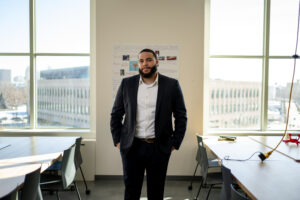
Nando Felten serves as community manager for Google’s Code Next Detroit.
Credit: Eric Bronson, Michigan Photography.

